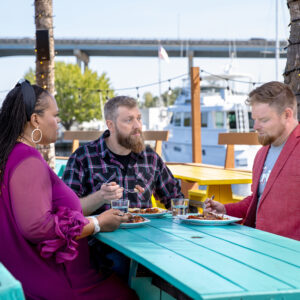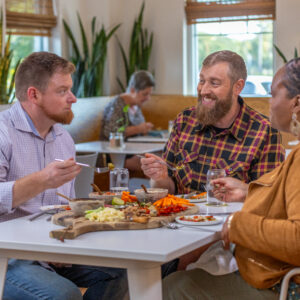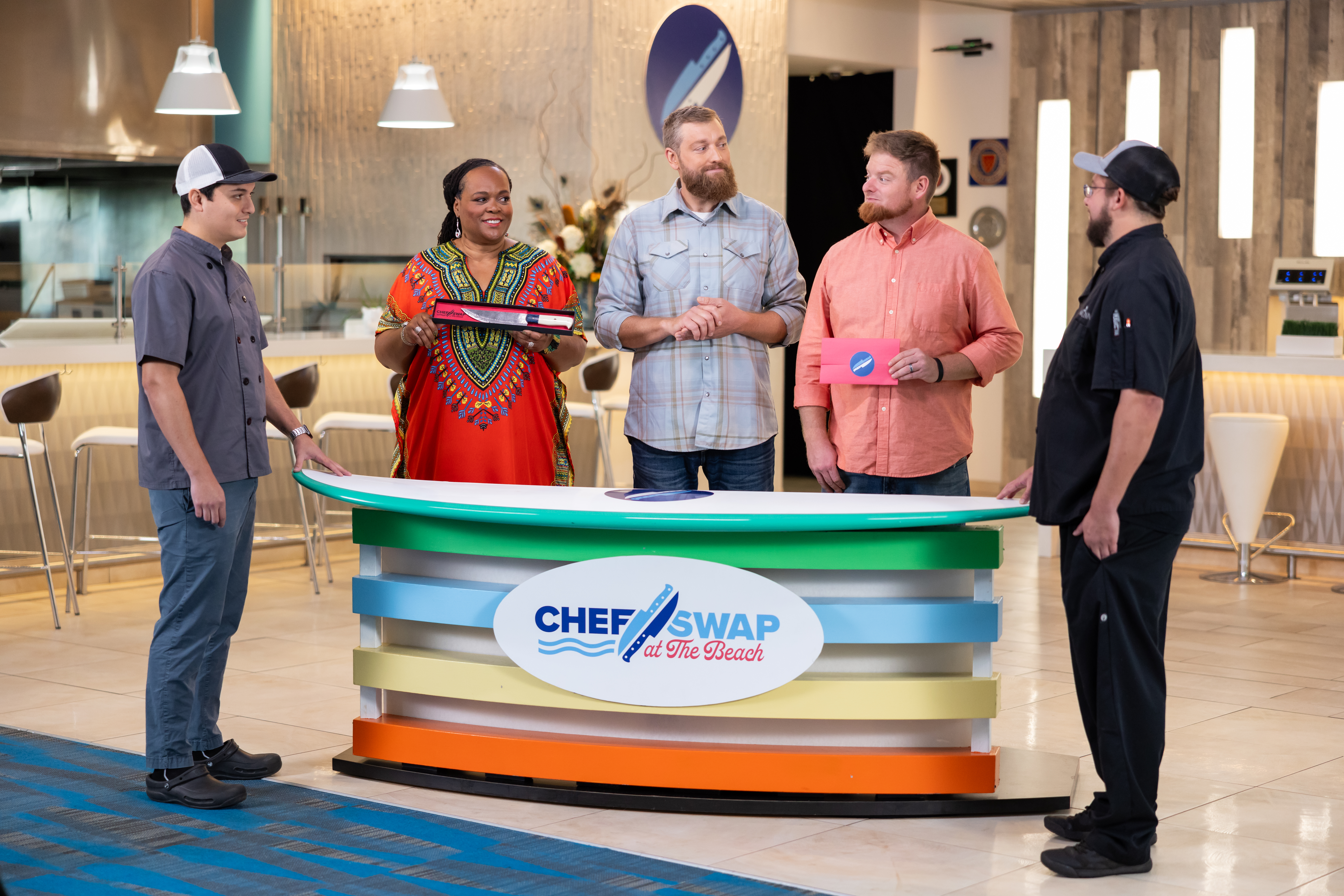Meet Mason Zeglen: The Chef Behind The Swap
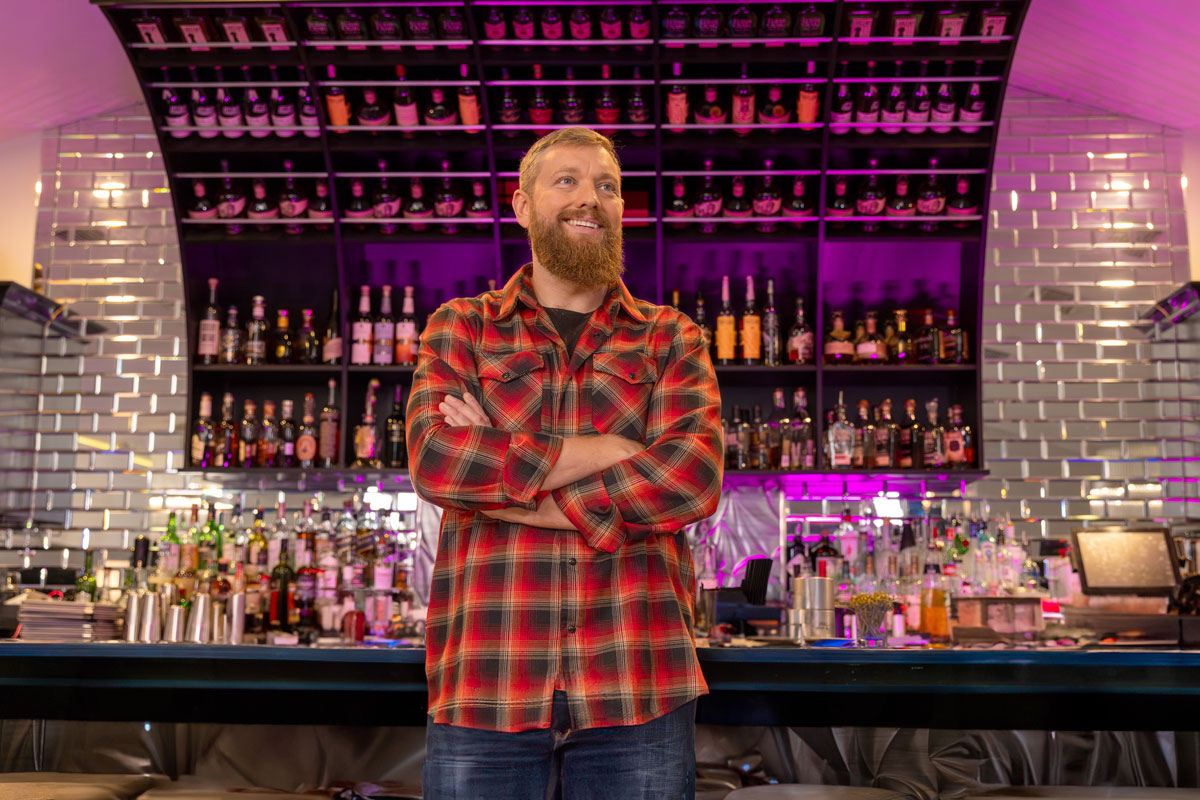
By Johanna Wilson Jones
Mason Zeglen is a peculiar fellow with an acute comprehension of food and its science, and holds immense power to revolutionize how people eat, think, and socialize when sustenance is the subject.
He is a sensitive soul who genuinely cares about people and puts compassion into everything his gifted hands generate. He is an award-winning chef and two-time champion in “Guy’s Grocery Games’’ on the Food Network. No one should be surprised to know he has been at the helm of some of the most innovative eateries in America and competed in HBO MAX's “The Big Brunch.’’
If you know him, you know genius is a word to which he is worthy. Polite and humble, his rustic persona, golden culinary wisdom, and refined palate make him a remarkable host of Chef Swap at The Beach Season 2.
His newest gig is how I met him and witnessed firsthand what stupendous artistry he possesses. As the owner and executive chef of Milk & Honey Café, at 352 US 17 Business in Surfside Beach, he delivers uptown pastries, novelty breakfast items, and brunch with brilliance.
I watched him make a menu item dubbed soft scrambled toast, and he did so with the delicacy of a mother holding her newborn. Attentive and loving, he slowly lifted the scrambled eggs from a small pan. The eggs, left a bit runny inside, have lemon-herb mascarpone folded into them. Served on toasted sourdough made in-house, it comes with two pieces of crispy bacon. A drizzle of secret green oil and fresh sprigs of dill are the finishing touches he adds before the plate goes out.
Zeglen, who visited the Grand Strand with his kin for nearly 20 years, is now a resident of Horry County and opened Milk & Honey Café in 2022. As the owner and executive chef, Zeglen, and his staff have earned a Google rating of 4.8 stars from patrons.
Locals declare his shop is one of the best in town.
“He always puts out the best food there is,’’ said Anastasia Zeglen, his big sister who resides in their native state of Vermont. “He has learned everything from the ground up in a restaurant. He has torn down restaurants and built them back up. The man is an amazing extremist. He has to be extreme in everything.”
A Foodie’s Friend
Good ideas come, and you can’t let them escape.
So, Mason Zeglen stays ready.
“When it comes to you, you’ve got to go write it down,’’ he said in the kitchen of his café. “I keep a notepad next to my bed because you never know. I write stuff down all the time late at night. You are most creative when you are waking up and slowing down for the day.”
His intensity to be imaginative and maintain an unknown level of innovation shows in his food preparation and how he chronicles his ideas.
Meet the humble vegetable: the potato. People often slap it with butter, sour cream, and other toppings and marry it to a steak.
Confession: Most of us have done it that way, and there is nothing special about our treatment of this meek root vegetable.
Please record this certainty – potato will never present itself that way in Zeglen’s zone.
When Mr. Potato Head and Mrs. Potato Head come to Milk & Honey Café, he will take them on high and leave mouths proclaiming, “Have Mercy!”
A potato won't be its natural self because of the Zeglan effect.
After roasting the potatoes, he crushes them ever so slightly. Then, they go to the deep fryer to get crispy on all the edges but light and fluffy inside.
After their hot oil bath, they get sprinkled with herb salt.
“The herb salt contains rosemary, thyme, fresh garlic, sage, and kosher salt,’’ he said as he pushed a container of it near my nose so I could inhale the earthy, robust smell.
He combines those ingredients, grinds them up, and then sifts the salt. It is placed on a sheet tray to cure – yep, you read that right. This man makes his own salt and cures it. You and I have no shame and grab ours from grocery shelves. Anyway, during the curing process, everything dehydrates and preserves.
“Then, you can sprinkle it over anything,’’ he said.
After Mr. and Mrs. Potato Head get salted, the boom-boom keeps coming.
Zeglen takes roasted garlic confit and parsley and tosses them. The story ends with those potatoes mellowing in a tiny pool of béchamel sauce with bacon, egg, and sharp cheddar cheese, grated like snow, coming to the party to complete what is Zeglen’s version of a potato bowl.
“I wanted to play with the flavors of a baked potato,’’ he said. “I wanted to play with it differently and make it for breakfast.”
Zeglen takes this meticulous, scientific, and experimental approach to every menu item generated.
The moral to his marvel is this: Zeglen doesn’t do ordinary. He feeds you food dressed in clothes you never knew existed or you suspected would never fit.
The Champ Was Always In The Building
A gourmet gangster is what Zeglen is.
People know he is a don of deliciousness.
Native New Yorkers even give him props.
Usually tough, many New Yorkers think the world begins and ends in New York with everything, not excluding next-level cuisine.
So, Dana Brunetti’s admission was a shocking one.
He confessed, “The morning bun is so flaky and buttery. It has a good separation of layers, and the balance of sweetness is perfect."
Encounters with French-like excellent pastries are normal for New Yorkers.
“I’ve tasted stuff like this because I grew up in New York and in an Italian family; so, there was always pastries,’’ said Brunetti, who has since relocated with his wife, Valarie, to Surfside Beach. “But this morning bun is top-notch.”
The morning bun has a crunchy cinnamon-sugar crust and is a top seller.
It is but one of the galactic offerings from Milk & Honey Cafe's vast arsenal.
Classically trained in French cuisine, Zeglen is impacted by the gastronome worlds of New Zealand, Greece, the United Kingdom, the Caribbean, and Central America.
“We’re taking a lot of our influences from countries that don’t use sugar like the American palate uses sugar,’’ said Zeglen, a graduate of the New England Culinary Institute. “We are trying to make pastries based on different cultures or backgrounds where it’s a little bit more about the dough and less about trying to hit that bliss point. If you use enough sugar, it will trigger your brain into thinking it’s happy. It will start dumping dopamine.”
A beast from the beginning, he and his sister were raised by parents who were self-sustainable as agriculturists. They lived on a 27-acre farm in Vermont, with about half of it suitable for farming.
“We lived off of the land,’’ said Zeglen, who grew up in Sherburne, Vt., now known as Killington. “My parents went almost a decade just in bartering. They had a combined income of about $3,000 a year in the late 70s and early 80s.”
Outsiders called them poor.
“As a kid, you were kind of embarrassed because you see other people with more expensive stuff, more toys, and more shiny things than your family,’’ he said. “But we were rich in experience.”
When other kids were being kids, Zeglen was learning about agriculture and everything connected to it. He was driving a tractor by age 7 and started his own landscaping business then.
As he grew, his love for the land and food grew too. He didn’t allow negativity to deter him from his goals. Zeglen, who was diagnosed with dyslexia as a child, knew he was just as talented, if not more than the people surrounding him.
“Growing up with a disability, I always knew I may not be the smartest, but I can outwork anybody,’’ he said.
Between 12 and 13, his parents divorced, and he looked for ways to get out of the house.
His eyes get teary whenever his parents' divorce is mentioned, but Zeglen parlayed his pain into opportunities to explore his field early and began working in commercial kitchens at 12.
He got the job after his mom, a one-woman cleaning company who cleaned the homes of upper-crust residents, discovered he wanted to work in a professional kitchen. A restauranter who had seven eateries gave Zeglen his first job.
“When I showed up the person who saw me at the back door, brought me inside, and started training me on how to wash dishes,’’ he said. “Then, the chef walks up and asks (the person training him), ‘What are you doing?’’’
The chef alerted the employee that Zeglen wasn’t their new dishwasher. He fired the employee showing Zeglen how to wash dishes and gave Zeglen his job.
He became a garde-manger – the person in charge preparing cold foods like salads –on his first day on the job.
Zeglen has been in 20 different kitchens, most often in leading roles, and worked in places like New Zealand and the Cayman Islands.
“Mason is the best person I know, and he is so generous,’’ said Alison Zeglen, his wife. “His food has become more culturally diverse as he has traveled. He is distinguished from other chefs because he is kind and willing to teach employees while helping them grow. It’s not an ego thing. He wants people to make the best food they can make.”
